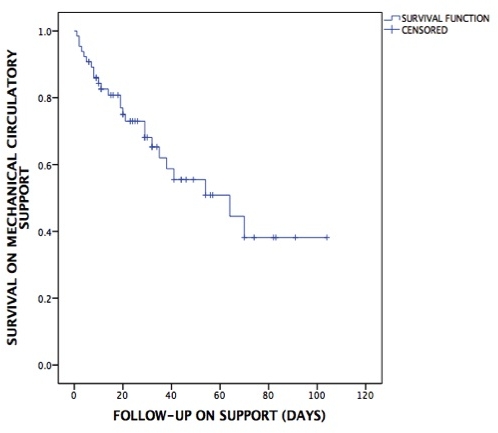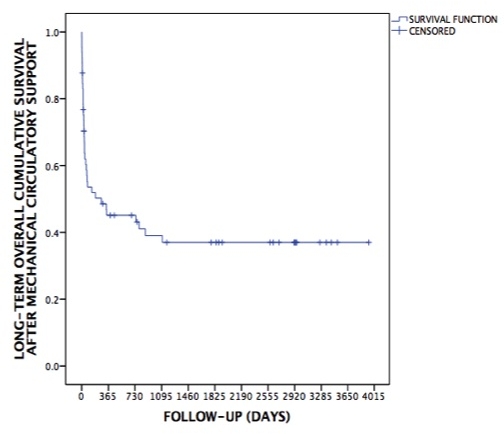The Role of Short-Term Ventricular Assist Device in Patients with Cardiogenic Shock – Is It Really a Solution?
Department of Cardiothoracic Transplantation and Mechanical Circulatory Support, Royal Brompton & Harefield NHS Foundation Trust, London, United Kingdom.
Meeting: 2016 American Transplant Congress
Abstract number: B146
Keywords: Heart assist devices, Heart failure, Outcome
Session Information
Session Name: Poster Session B: Hearts and VADs in Depth - The Force Awakens
Session Type: Poster Session
Date: Sunday, June 12, 2016
Session Time: 6:00pm-7:00pm
 Presentation Time: 6:00pm-7:00pm
Presentation Time: 6:00pm-7:00pm
Location: Halls C&D
Background: Low cardiac output syndrome is associated with significant mortality. In patients with refractory low cardiac output left ventricular assist devices (VAD) are used to re-establish cardiac output and to prevent death. However, long term LVAD implantation in these is complicated by a high rate of right heart failure and mortality. Therefore, our strategy is to implant a short term VAD (left or biventricular) as a bridge to long term LVAD or heart transplantation (HTx).
Methods: We retrospectively analysed data from 66 patients who received a short term LVAD support prior to implantation of a long term LVAD or HTx between 2009 and 2014. We performed short-term LVAD (CentriMag, Thoratec, CA, USA) implantation via median sternotomy with percutaneous cannulas. Patients were included regardless of perioperative status and severity of heart failure.
Results: Mean duration of support in the survivor group was 35 ± 25 days versus 25 ± 25 days in the non-survivor group (n.s.), range from 1 to 109 days. The overall survival on support was 40 (60%) patients. In the survivor group 12 patients could be successfully weaned from the system, 12 patients received a heart transplant and in 16 a long term VAD was implanted. In the non-survivor group the rate of preoperative extracorporeal life support, the rate of postoperative renal failure and multiorgan failure was significantly higher  :
:  .
.
Conclusions: Currently short term uni- or biventricular Levotronix CentriMag VAD owing its capacity for full ventricular support represents an ideal solution for bridge to bridge or HTx.
CITATION INFORMATION: Popov A, Zeriouh M, Anton S, Alexander W, Bartlomiej Z, Garcia D, Mohite P, Padukone A, Koch A, Ananiadou O, Fazekas L, Simon A. The Role of Short-Term Ventricular Assist Device in Patients with Cardiogenic Shock – Is It Really a Solution? Am J Transplant. 2016;16 (suppl 3).
To cite this abstract in AMA style:
Popov A, Zeriouh M, Anton S, Alexander W, Bartlomiej Z, Garcia D, Mohite P, Padukone A, Koch A, Ananiadou O, Fazekas L, Simon A. The Role of Short-Term Ventricular Assist Device in Patients with Cardiogenic Shock – Is It Really a Solution? [abstract]. Am J Transplant. 2016; 16 (suppl 3). https://atcmeetingabstracts.com/abstract/the-role-of-short-term-ventricular-assist-device-in-patients-with-cardiogenic-shock-is-it-really-a-solution/. Accessed July 5, 2025.« Back to 2016 American Transplant Congress
